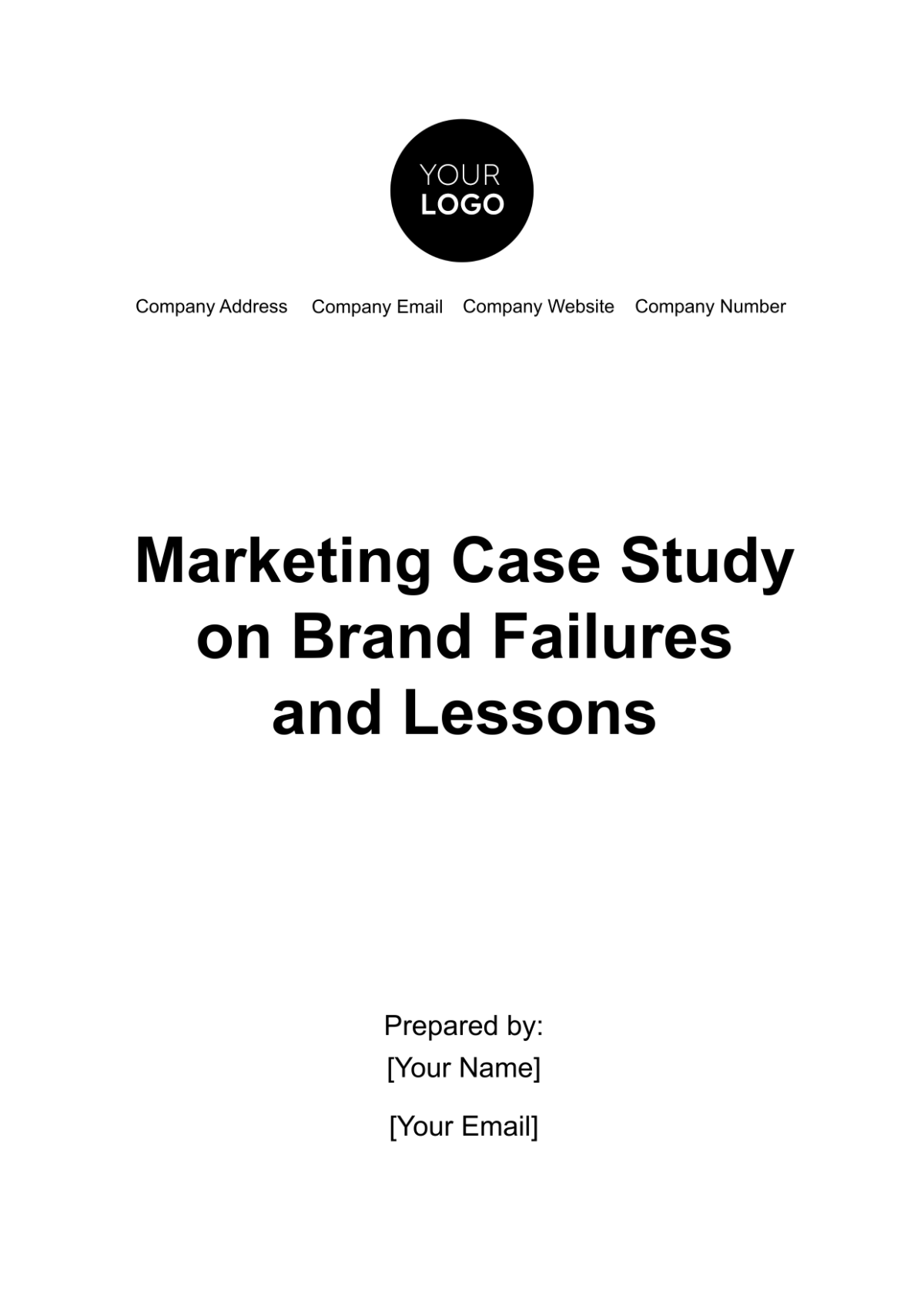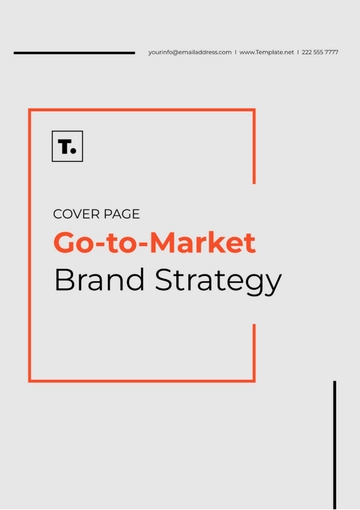Free Marketing Case Study on Brand Failures and Lessons

Title: "PepsiCo's Kendall Jenner Ad Fiasco: Lessons in Brand Misalignment"
1. Executive Summary
This case study examines the ill-fated marketing campaign undertaken by PepsiCo, featuring Kendall Jenner. We delve into the issue surrounding the campaign's release, analyzing the factors contributing to its failure. The primary lesson learned from this case is the importance of aligning brand values with advertising messages.
2. Introduction
PepsiCo, a global beverage and snack giant, holds a significant position in the consumer goods market. With a rich history dating back to 1965, PepsiCo has consistently competed with its rival, Coca-Cola, in a relentless battle for market share. In April 2017, the brand attempted to revamp its image with a marketing campaign featuring Kendall Jenner, a popular model and celebrity. Unfortunately, this campaign proved to be one of the most infamous marketing failures of the decade.
3. Background
The ill-fated marketing campaign was launched in an era of heightened social and political activism. PepsiCo aimed to connect with millennials and Gen Z consumers by capitalizing on unity, diversity, and social change themes. The brand's target audience included socially conscious individuals who were vocal about their beliefs and values on platforms like social media. By attempting to align itself with these ideals, PepsiCo sought to portray itself as a socially responsible and forward-thinking company.
However, PepsiCo's history primarily revolved around selling carbonated beverages and snacks, which posed a significant challenge in connecting with the campaign's themes. The brand had not been traditionally associated with social activism, making it difficult to establish authenticity in its messaging. Despite these challenges, the marketing team pushed forward with the campaign, leading to the critical misalignment of brand values and the subsequent failure of the Kendall Jenner ad.
4. Problem Statement
4.1 Problem
PepsiCo faced the challenge of revitalizing its brand image to resonate with a younger, socially conscious demographic. The brand struggled to connect with consumers who increasingly valued authenticity, social responsibility, and alignment with their values.
4.2 Failure Explanation
The marketing campaign featuring Kendall Jenner was considered a failure due to the profound disconnect between the campaign's intended message and the reality of PepsiCo's core business. While attempting to portray itself as a socially responsible and socially conscious brand, PepsiCo's history as a seller of carbonated beverages and snacks did not align with the themes of social activism and unity portrayed in the campaign. This dissonance led to widespread criticism and backlash, as consumers viewed the campaign as insincere and opportunistic.
5. Marketing Strategy
5.1 Campaign Overview
The marketing campaign featured a short film in which Kendall Jenner, depicted as a model, joins a street protest. She approaches a line of police officers and hands one of them a can of Pepsi, seemingly diffusing tension and uniting the crowd in celebration. The campaign aimed to leverage the growing activism in society, particularly among millennials and Gen Z, to reposition PepsiCo as a brand that stood for unity and social change.
5.2 Goals, Tactics, and Resources Allocated
Goals |
|
Tactics |
|
Resources Allocated |
|
6. Failure Analysis
6.1 Factors Contributing to the Failure
Inauthenticity and Opportunism: One of the primary factors was the perception of inauthenticity. PepsiCo's history as a sugary drinks and snacks manufacturer clashed with the campaign's attempt to align with social justice and activism. Consumers perceived the brand as exploiting important social issues for commercial gain.
Tone-Deaf Execution: The campaign's portrayal of Kendall Jenner's peaceful resolution of a protest through a simple Pepsi can be seen as tone-deaf and trivializing genuine social movements. It failed to recognize the complexity and gravity of the issues it sought to address.
Social Media Backlash: The campaign faced immediate backlash on social media platforms, with consumers and activists condemning it as insensitive and out of touch. Hashtags like #PepsiLivesMatter trended, further damaging the brand's reputation.
Lack of Consumer Insight: PepsiCo's marketing team appeared disconnected from the values and concerns of its target audience. They underestimated the intelligence and discernment of millennials and Gen Z consumers, leading to a misjudgment of the campaign's potential impact.
Competitive Landscape: Coca-Cola, PepsiCo's main competitor, had successfully maintained a neutral stance in political and social matters. PepsiCo's attempt to take a bold social stand backfired in comparison to Coca-Cola's more cautious approach.
7. Lessons Learned
7.1 Key Lessons
The failure of PepsiCo's Kendall Jenner ad campaign offers several valuable lessons for brands in the realm of marketing and advertising:
Authenticity is Paramount: The case underscores the importance of aligning a brand's core values and history with its marketing messages. Authenticity and genuine commitment to social issues are critical when attempting to engage with socially conscious consumers. Brands should avoid appearing opportunistic or insincere.
Cultural Sensitivity: Understanding the cultural and social context in which a campaign is launched is crucial. Brands must be acutely aware of societal issues and be sensitive to the potential impact of their messaging. Tone-deaf campaigns can lead to severe backlash.
Listen to Your Audience: PepsiCo's campaign failed to resonate with its target demographic because it did not adequately listen to the concerns and values of millennials and Gen Z. Brands must actively engage with their audience and take their feedback into account when crafting campaigns.
Crisis Management Matters: The immediate and effective handling of a crisis is vital. Brands should have a crisis management plan in place to respond to negative reactions swiftly and appropriately.
7.2 What Could Have Been Done Differently
To achieve a better outcome, PepsiCo could have taken several different approaches. They might have:
Conducted thorough market research and audience analysis to better understand their target demographic's values and concerns.
Involved socially conscious influencers or activists who were already aligned with the campaign's message, rather than relying solely on a celebrity endorsement.
Piloted the campaign internally or conducted focus group testing to identify potential issues before launching it to the public.
Acted swiftly and decisively in response to the initial negative reactions, potentially issuing an apology or reevaluating the campaign's messaging.
8. Recommendations
Reevaluate Brand Messaging: PepsiCo should undertake a comprehensive reevaluation of its brand messaging to align with contemporary consumer values. This may involve a more consistent commitment to social and environmental causes or a rebranding effort that reflects these values.
Engage in Social Responsibility: The brand should actively engage in social responsibility initiatives, such as sustainability efforts, community involvement, and ethical sourcing. This will help build a more authentic reputation over time.
Invest in Audience Insights: Continuous investment in audience research and consumer insights is critical. PepsiCo should regularly assess its target audience's evolving preferences, values, and attitudes to inform marketing strategies.
Crisis Preparedness: Develop a robust crisis management plan that includes monitoring social media channels for immediate feedback and having response strategies in place to address any negative reactions promptly.
9. Conclusion
PepsiCo's Kendall Jenner ad campaign serves as a cautionary tale in the world of marketing. The misalignment of brand values and messaging, coupled with a lack of cultural sensitivity, led to a major marketing failure. The key lessons learned from this case emphasize the importance of authenticity, cultural awareness, listening to the audience, and effective crisis management.
Brands, regardless of their stature, must be vigilant in staying attuned to the values and expectations of their target consumers. Failure to do so can result in significant reputational damage. Moving forward, PepsiCo has an opportunity to rebuild its image and connect with younger, socially conscious consumers by adopting more authentic and socially responsible marketing strategies. By learning from this misstep and implementing the recommended changes, brands can navigate the challenging landscape of contemporary marketing with greater success.
10. References
The following sources were referenced in the preparation of this case study:
Smith, J. (2017, April 5). Pepsi pulls widely mocked Kendall Jenner ad. CNN Business.
Johnson, M. (2017, April 6). The Pepsi ad that became a total protest fail. BBC News.
Marketing Week. (2017, April 7). PepsiCo pulls controversial Kendall Jenner ad.
O'Reilly, L. (2017, April 6). Why Pepsi's Kendall Jenner protest ad backfired. AdAge.
11. Appendices (if necessary)
Appendices are not included in this case study, as the information provided in the main body of the text is sufficient to convey the key points and analysis.
12. Acknowledgments (optional)
The creation of this case study was a collaborative effort, and we would like to express our gratitude to the following individuals and organizations who contributed to its development:
John Smith: Provided valuable insights on the marketing strategy analysis.
Marketing Analytics Institute: Shared relevant data and market trends for the failure analysis.
Creative Solutions Agency: Assisted in the design and layout of the case study document.
Their expertise and contributions significantly enriched the quality and depth of this case study.
- 100% Customizable, free editor
- Access 1 Million+ Templates, photo’s & graphics
- Download or share as a template
- Click and replace photos, graphics, text, backgrounds
- Resize, crop, AI write & more
- Access advanced editor
Introducing Template.net's Marketing Case Study on Brand Failures and Lessons Template. This editable and customizable resource equips marketers with insights from past failures. Utilize our Ai Editor Tool to adapt strategies, learn from missteps, and fortify brand resilience. Elevate your marketing game with this essential resource.





























